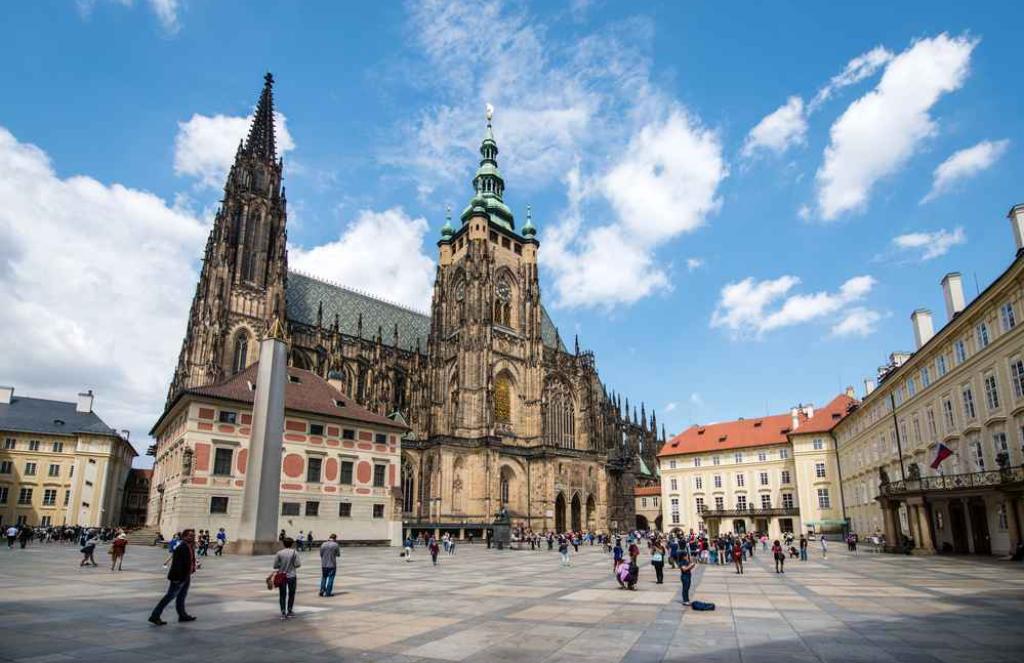Thessaloniki gets ready for its metro launch in November
The underground rapid transit lines have been under construction for almost two decades due to various project delays
 TheMayor.EU logo
TheMayor.EU logo 
Should the St. George courtyard of the Prague Castle open to the public or not?, Source: Depositphotos
The legal battle has concluded one chapter but a new one might be yet brewing
The Prague Castle rises majestically above the Czech capital and is one of its premier symbols. As such most visitors to the city are eager to check it out and walk around its grounds.
However, the castle is also where the Czech Presidential Office and Residence are located. And even though Prague Castle has been declared the largest castle in the world according to the Guinness Book of Records, it seems that it might just not be large enough to satisfy both the claims of the public authorities and the civil sector. These have been locked in a bitter legal battle over the issue of whether the courtyard should be open and accessible to the general public or not.
The civil society’s interests in the matter have been represented by Kverulant, a Czech NGO whose stated purpose is to advocate and fight for all issues of public interest that the citizens don’t have the time and resources to do on their own.
According to Expats.cz, the organization was initially successful at the Prague Municipal Court, however, the Czech Ministry of the Interior appealed the decision at the Supreme Administrative Court (NSS), which then overturned the decision of the lower-rung court.
This now means that visitors cannot freely access St. George’s Square, as the inner courtyard, located between the St. Vitus Cathedral and St. George's Basilica, is officially known. That is, the public may only be allowed on special occasions upon the discretion of the castle administration.
The argument of the court states that since this is a place where the Czech President exercises his daily duties and thus it’s a question of security.
We are disappointed by the NSS’s decision; we do not understand it. The way we interpret it, it means that Prague Castle does not belong to the people, but to the authorities. We are not putting up with this," said the director of Kverulant, Vojtěch Razima.
It seems that it was only the previous president who decided to restrict access in 2016, and the current one is continuing this policy. Kverulant, however, has been fighting against this for the past eight years with the argument that this is turning the Castle into an abode of a monarch akin to the medieval times when the commoners were not allowed to go inside.
Kverulant is adamant that the fight is not over, and they will appeal the decision at the Constitutional Court of the country.

The underground rapid transit lines have been under construction for almost two decades due to various project delays

Now you can get your wine in Talence by paying directly in Bitcoin

That’s because the state has to spend money on updating the railway infrastructure rather than subsidizing the cost of the popular pass

Rethinking renewable energy sources for the urban landscape

The examples, compiled by Beyond Fossil Fuels, can inform and inspire communities and entrepreneurs that still feel trepidation at the prospect of energy transition

Now you can get your wine in Talence by paying directly in Bitcoin

The 10th European Conference on Sustainable Cities and Towns (ESCT) sets the stage for stronger cooperation between the EU, national and local level to fast track Europe's transition to climate neutrality.

At least, that’s the promise made by the mayor of Paris, Anne Hidalgo

The underground rapid transit lines have been under construction for almost two decades due to various project delays

At least, that’s the promise made by the mayor of Paris, Anne Hidalgo

Hostal de Pinós is located in the geographical centre of the autonomous region

Despite its church-y name, the district has long been known as the hangout spot for the artsy crowds

Urban dwellers across the EU are having a say in making their surroundings friendlier to people and the environment.

Forests in the EU can help green the European construction industry and bolster a continent-wide push for architectural improvements.

Apply by 10 November and do your part for the transformation of European public spaces

An interview with the Mayor of a Polish city that seeks to reinvent itself

An interview with the newly elected ICLEI President and Mayor of Malmö

A conversation with the Mayor of Lisbon about the spirit and dimensions of innovation present in the Portuguese capital














